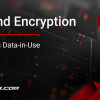Through player clubs and loyalty programs, casinos collect Personally Identifiable Information (PII) in many forms. This information provides marketing teams with highly valuable information. However, the high value and large volume of this data makes theft a lucrative business. Object signing provides the root of trust necessary to secure the operation of casino games and capture of data, while Point-to-Point Encryption (P2PE), database encryption, and tokenization protect data that has been submitted.
Futurex hardware security modules (HSMs) encrypt PII in a FIPS 140-2 Level 3 validated cryptographic module. If stolen, the data would be need to be decrypted using an inaccessible cryptographic key. To prevent the decryption of stolen data, keys are stored within the HSM and are subject to both physical and logical protections. In the unlikely case that encrypted data were to be stolen, it would be useless to those seeking to profit from it.
For data in motion, HSMs enable private key storage for TLS encryption, a type of encryption commonly used to secure web traffic between a browser and a server. Storing TLS private keys inside an HSM provides greater security for the exchange of PII over the Internet. Additionally, processing TLS handshakes within a dedicated cryptographic module frees up processing power within the web server itself while also providing tamper responsiveness, scalability, and secure storage for cryptographic keys.
In addition to the use of TLS encryption, organizations often rely on tokenization for securing cardholder data (CHD) while also reducing the scope and cost of fulfilling compliance mandates. Storing CHD as clear data poses a security risk and is subject to heavier PCI DSS regulations. Tokenization allows sensitive data to be replaced with an identifying string, or “token,” for storage after the transaction has taken place. A hardware security module executes this so that the data is never stored as clear text.





